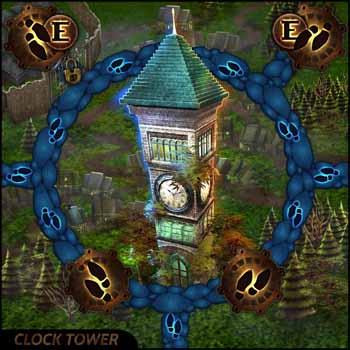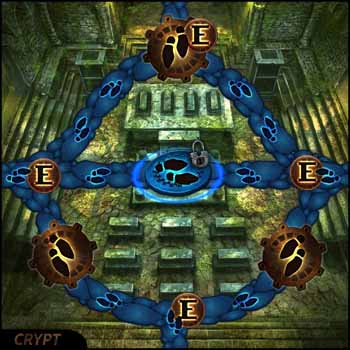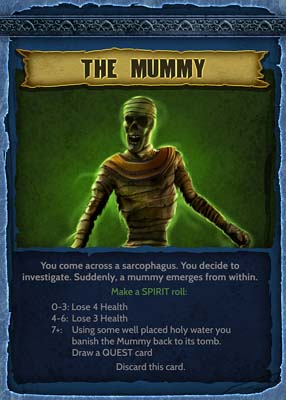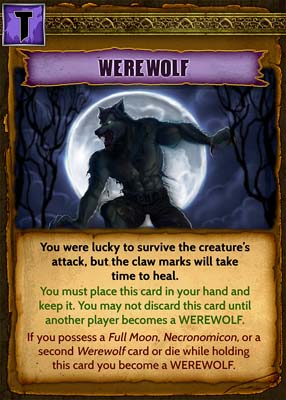It’s been two weeks now tracking down the supposed causes of what plagues this land, but like everything in this blasted place, you can’t seem to make heads or tails of it. All you know is that the fear keeps rising and for every new adventurer who shows up for their chance at the cure, another falls prey to the forces at work.
You spin the revolver chamber one more time for good measure. These bullets, you wonder, will they be for the beasts terrorizing the countryside, or will they be for you?
That is the sort of conundrum you face when you enter Transylvania: Curses and Traitors. Inside this adventure game, players must explore and acquire important items in the hopes of collecting those necessary to lift the evil curse that has taken hold of the land.
The game begins, as with any good horror story, with a church. Players take on the roles of daring adventurers, and each comes with five stats: Health, Movement, Attack, Mind, and Spirit. Transylvania unfolds by flipping over new tile boards, and players take turns moving along the different paths to open up new tiles. Tiles like these:
How and where you move is at the whim of your adventurous spirit, but you are limited to your maximum Movement each turn.
A Noble Quest – Foolish, But Noble
The two most important tile spaces are Quest token locations and Event locations. Quest token locations provide a player with a challenge to overcome in exchange for clues to the mission at hand, but they are are entirely optional. Because, hey, if you don’t want to stop and gather intel, that’s up to you. Some heroes just can’t be bothered with such things.
Event locations, on the other hand, cannot be skipped. For each Event location, be it from a Full Moon or an old man on the road, the player must stop and resolve an Event card depicting something happening in the land of Transylvania. So, as you’d expect, these aren’t all that favorable to the player.
Almost all Events and Quest challenges in Transylvania function on a Pass / Fail system, where the player rolls a number of special dice equal to the stat being challenged – be it Attack, Mind, or Spirit. If the dice total meets or beats the challenge, you pass.
For Quest challenges, passing means you clear that space and draw a Quest card, whereas failing means nothing happens. Events are sort of the opposite: passing an Event may or may not reward you with something, but failing one is always bad. Potentially six feet under type bad.
Although there is an overarching threat to all players, though, Transylvania is not a co-op game. How you interact with other players is entirely up to you. While some Event cards reward you with Quest cards, they’re usually attained by either exploring uncleared Quest tokens, or by stealing cards from other players. One path makes the game more combative, while the other is less confrontational (but also far less interactive) as each player scatters in different directions. The choice is yours.
The bulk of a player’s turn consists of taking simple actions, and most of them revolve around acquiring and/or using Quest cards. Quest cards come in three types: Knowledge, Items, and Transformation. Items provide stats and abilities throughout your journey, but not all of them are universally good.
Knowledge cards (and the rarest of three kinds), are the bits of thematic information players need to win the game. If you can gather five of the right Knowledge cards and make it back to the church, victory is assured.
By contrast, Transformation cards are the type of Quests you don’t want to be on, like trying to find your keys after already waking up late: they’re unavoidable and generally end poorly. If you get too many Transformation cards of the same kind, or you die holding one, then you are resurrected as one of the game’s three Monsters you’re trying to hunt down.
Should that happen, your goal in the game shifts entirely. Instead of trying to lift the Transylvanian curse, your goal becomes hunting down and killing the other players. In fact, that’s pretty much all you can do should you become the Vampire, Werewolf, or Zombie. Monsters don’t have items or trigger Events. Instead, they have a very linear turn: move towards a player, and if you meet up with them, you fight. While incredibly thematic, apparently Monsters aren’t very deep, nor will your turn as one be.
When an Adventurer and Monster fight, combat ensues, with the Monster usually having the advantage (being an unholy creature of the night and all). Players roll off, and the loser takes damage equal to the difference in the dice results. Kill enough players as the Monster, and the game is yours. If an Adventurer slays a Monster though, they win, as their task is accomplished. (And as well they should; slaying a Monster isn’t easy.)
If you die without becoming a Monster, you’ll at least get to come back as bait another Adventurer, and the dance continues until one of the three win conditions are met.
Village Voices
Transylvania comes across as the classic definition of an Ameritrash board game: an adventure into an interesting narrative and lessons of probability. On the one hand, there is a fantastic amount of theme at work here, as players balance frantically scouring tiles for the items they need to win while chancing becoming the very creatures they seek to stop. On the other hand, Transylvania is heavily luck-based. From Quest tokens, to the majority of Events, to combating other players, most results in the game are all at the whim of a good dice roll, and whether the cards you receive will be the preciously elusive Knowledge cards or those that’ll turn you into a Monster are also at the whim of chance.
Indeed, Transylvania: Curses & traitors is evidence that traditional Ameritrash games do exist, giving players an interesting narrative and a set of dice to see if they can survive the night. That, or turn traitor and rule it. If you’re up for saving this perpetually crestfallen countryside, then head on over to Kickstarter.
Photo Credits: Monty Python by Sony Pictures; Kermit by Walt Disney Studios.




